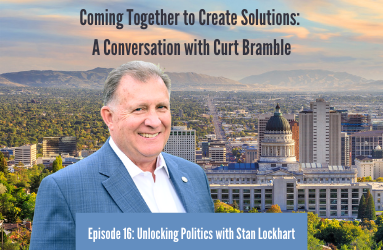Coming Together to Create Solutions: A Conversation with Curt Bramble
Curt Bramble and I have been friends for many years. He is going into his 21st session as a Utah State Senator this year. He was first elected in Nov. of 2000. I pointed out that this is a long time but Curt countered that with the time that you spend serving it really isn’t that long.
20 Year Career

Curt said, “It’s interesting because it is a long time on one hand but keep in mind, we serve for 45 days a year. That’s a month and a half a year. If you do the math, if you serve for 8 years at a month and a half per year, that means that after 8 years you have 12 months, just one year of actual full time equivalent. So, 20 years sounds like a long time, but keep in mind that if you actually convert that to the number of months that were in session doing the people’s work, 20 years equates to no more than 2 and a half years full time.
I made the point that although we call it a part-time, 45-day session, you are kind of on-call 365 days out of the year.
Curtis said, “Well you are in terms of responding to constituents and trying to work out problems. However, the real experience is the actual time in the legislature: sitting in committee meetings, being on the floor, and officially taking care of the people’s business. One of the frustrations that many of us are experiencing right now is the significant number of special sessions we’ve been having.
Citizen Legislature
I asked Curtis to explain what a citizen legislature is since that’s what we have in Utah.
Curtis Bramble explained, “If you look at the makeup of both the bodies, we are just average citizens coming from across a spectrum of livelihoods and life experiences. From doctors to lawyers to accountants to farmers and teachers to truck drivers, it is a broad spectrum of average citizens who take some time out of their family life, out their business life, and out of their recreational opportunities to serve the people.”
How CPA Background Helps as a Senator

I asked Curtis to explain to me how his profession as a CPA has translated into being an effective legislature.
Curtis explained, “One of the primary responsibilities of the legislature is the appropriations process, the finances of the state, and directly tied to that is tax policy. I’ve had the opportunity to spend the last 4 years defending citizens against the intrusion or the heavy hand of government, both from the federal, IRS, State tax commission, and other regulatory bodies. Having that perspective, defending the little guy against government gives me a unique perspective when we’re sitting in committee and as we debate various policies.”
Curtis has had the opportunity to be involved in the creation of tax code over the last 20 years.
“In the last 20 years we have rewritten, effectively rewritten ourselves tax code, our income tax code, taxpayer bill of rights, property tax, a number of tax issues, so it’s a well over half the tax code, probably somewhere around 75% now I’ve been directly involved in fine tuning, amending, or reforming.”
Our tax code varies from the rest of the nation. I asked Curtis Bramble to explain what sets Utah apart:
“You can look at it from a conservative world liberal perspective, it doesn’t matter. The American Legislative Exchange Council, ALEC they put out a publication, ‘Rich States, Poor States’ and they ranked states based on a whole host of metrics including tax policy and tax policy is one of their key qualifiers.”
“Or you can look at the Pew foundations or the McArthur Foundation, go down through the think tanks nationally, you’ll find that Utah over the last 20 years has either been ranked number 1 or in the top 3. In the last 15 years, we’ve been number one “Rich States, Poor States’ ‘ from the inception of the publication I think 12, 13, 14 years ago, we’ve been number one every year. The proof is in the robust economy. We have a vibrant economy. Even with COVID, we are doing far better than the vast majority of the states. That really is attributable to our business climate, our social climate, and the character of the state.”
Memorize the Tax Code?
There is a rumor has it that you’ve memorized the tax code because you frequently quote from it when you’re on the floor of the senate. Is there any truth to that?
“Well the truth is that when I read a bill or read a section of code, I don’t have to memorize it, it just somehow comes back to me in my moment of need. So yeah, there is some truth to being able to recite chapter and verse, line numbers on bills. It might be a little more myth than reality. “
Path to Senator
What prepared you to become a State Senator Curt?
“Well a good friend of mine was involved in politics and became Chair of the Utah County Republican Party, then he became Chair of the State Republican party, he had been a Provo City Councilman, his wife was the first female Speaker of the House in Utah, and he twisted my arm, and in a moment of weakness I said that I’d step up.”
I remember doing that.
Effectiveness in Politics

“It’s interesting Stan when you talk about effectiveness in politics, you and I were involved from my very first session on a bill that the administration didn’t want, that leadership didn’t want and it was a critical tax bill that if we didn’t pass this bill, the company that you worked for would have to leave the state. If you recall Micron literally could not have remained in the state of Utah had we not amended the state tax code.”
“So how did we do it? You were brand new in the lobbying arena, I was brand new in the Senate. So if you go back and you analyze there are some key principles that we used then and that we’ve refined over the years that result in being very effective in taking care of public policy.”
“It starts with defining a problem, and not just defining it from one perspective or through one prism, but defining it globally so that even your detractors will agree with the definition of the problem that you want to solve. If you get universal agreement if you get consensus on the problem, what was our problem with tax policy? it was very clear that if we didn’t change our tax policy, Micron would have to leave the state.”
“ We had a provision, esoteric, deep in the weeds on the deductibility of consumables used in manufacturing. Everybody agreed that that was a problem. From the CEO of Micron to our tax commission to the Governor’s office of economic development, we had consensus with universal agreement that that was the problem. Once you do that, it is far easier to start debating what is the right approach to solving the problem and that eventually leads to a solution that has a broad-based buy in.”
“ And those steps of first defining a problem and getting an agreement on what the problem is. Quite often if you watch the legislative process, legislatures come up with great ideas. And a good percentage of those great ideas are solutions looking to find a problem to solve. If you approach it the other way and you clearly define what the challenge is, what the problem is, and you even get your detractor. You know you can take global warming, we can find consensus on air quality while we may not be able to find consensus on anthropomorphic climate change or whatever. But everyone agrees we want to breathe clean air, we want to drink clean water, we want to stop forest fires, and we want to do things that are responsible for the environment. And you can rally around that dirty air is unhealthy, far easier than you can rally around the idea that if we don’t do something the oceans are going to wash away Florida or whatever.”
Defining the Problem: Energy Policy

“Defining a problem really is core to the whole legislative process. If you have a bill, you have an issue you care about. If you want to have a bill written you’ve got to clearly define the problem. And then I’ve always said that instead of coming up with a pre-packaged answer, instead of trying to persuade legislators to come up with answers they don’t want, you need to find something that legislatures want to get behind. There’s 100 different ways to solve any problem. You define the problem clearly and you come up with a solution that legislators want to get behind.”
“So we cross the first hurdle where we have the universal agreement on the problem, then when you have a myriad of different approaches, different solutions you could have that discussion for years without moving the ball.”
“It’s important to come forward with what you believe is a rational, practical, doable solution to the problem recognizing that that is just one of the myriads of solutions and then invite folks to tell you why your solution isn’t the best. But when you do that you have to say, ‘Okay, if you don’t like what I’m doing, that is fair. Tell me what you would do that is better.’ Don’t just wring your hands.”
“ You were in the room when we defined the state energy policy. I believe it was 2008 or 2009. We had every group stakeholder and special interest from the most radical and environmental organizations to the most hard-core industrial organizations and everywhere in between from energy producers and energy consumers etc.”
“ If you recall, we started out with a bill and we went around the room and said okay when you oppose something there’s no accountability, no responsibility with opposing something, that’s easy. It’s far more difficult and it takes some courage to say I don’t like X, I prefer Y and here’s why I prefer Y or Z as opposed to X. So when we did the state energy policy, what did we do? We threw out a bill on the table, we said there’s a starting point. The final bill won’t look anything like this, but if you don’t like something in this bill, that’s fine. Tell us the line numbers, tell us the language you don’t like, but that’s not good enough tell us what you would do instead, give us something practical, concrete to replace what you don’t like. If you recall after 6 weeks of hard-fought negotiations, we unanimously passed a state energy policy.”
“We set a couple of baseline principles. We said, ‘Okay number one, the environmental community wanted a renewable portfolio standard meaning they wanted to have a certain percentage of our energy portfolio coming from renewable energy regardless of the status of scientific advancements or technology.’ And we said, ‘Look, we may set goals but we’re not going to do a mandate because we don’t know what the science is going to evolve over the next 20 years. So, let’s set a target, let’s set a goal, but if you want a mandate and if no matter what we do in the bill that you like, if there’s no mandate you’re going to oppose it.’ We literally said, ‘Don’t waste our time, don’t waste your time, there’s the door, there won’t be a mandate but we are going to do a lot of really good things that we think you’ll like.” And everybody stayed at the table. And that was critical. The other thing we said was whatever we do it has to be cost effective and we’ll pursue any energy policy if cost effective. Those few words of ‘Cost Effective’’ really drove the discussion and everyone bought into it.”
Impact of Energy Policy

“And for a long time our energy policy was looked at kind of as a model for other states. And I don’t know now, 12 or 15 years later, I’m not sure what other states are doing but I do know that ours is still intact and still generally supported by all the parties.”
“And look what it has given us: we have solar farms, we have wind farms, we have geothermal, we have energy storage that’s on the cutting edge, as well as traditional coal and hydropower whatever. Utah has not had the problems that other states have, we have one of the lowest energy costs in the nation. As we’re pursuing solid environmentally responsible energy policy.”
Reputation as an Effective Legislator
Curt Bramble, you’re viewed by many national publications as being one of, if not the most effective legislator in the entire country. Tell me how you get that reputation.
“Stan, I joke when I talked about being able to recall what I’ve read. I think that going back to those principles on how you take on a problem, how do you bring people to the table and how do you get real buy in? Well, you have to be willing to listen. If you look at your opponents, when I say opponents I mean folks on the other side of an issue, if you will attribute to them the same passion, the same conviction, the same sincerity, the same sense of correctness that you possess from your own position, now you don’t have to demagogue you don’t have to demonize. You can limit your discussion to the essence of whatever the issue is that your debating, you don’t have to look for ulterior motives. And then that goes a long way in being able to internalize where you’re coming from and it helps pave the way to find the solution that both you and they can accept.”
How Change Over 20 Years
“When I was first elected I looked at politics pretty much as a direct no holds barred debate, and so you’d come in expecting folks to give you their best shot and you’d give yours, and you’d have a discussion and you’d let a majority vote win the day. I probably mellowed, probably been a little more restrained and more maybe a little more open looking in other points of view as we discuss issues.”
How to Be Effective
“I think one of the key elements of being effective is doing your due diligence. Studying the issues, reading the bill, quite literally I’ve read every bill that I’ve ever voted on. When you read the bills, and you have questions about the bills before they come up for a vote in committee, before they come up for a debate on the floor, you try to broaden your horizon and to get answers to those questions and that helps in terms of you being effective when you do articulate your position.”
“You know during the tax reform last year, I didn’t support the process and the policy of that tax bill. It doesn’t make sense to bring a bill out the day before it’s voted on in a special session. It doesn’t make sense to bring a controversial bill out at the last day of the session or in the final minutes of the committee, and here’s why: I’ve spent my career defending clients with the IRS and serving. I take on 2 or 3 cases a year as an expert witness. I want to read what the opposing counsel says. I want to know what the IRS says. I want to know what the other side is, what their perception is, what their analysis is, and what their data is. I want to know what their arguments are. I want to know those arguments sooner rather than later.”
“Keep in mind, if someone opposes you on a bill, they likely will oppose you whether it comes out last minute or if it comes out three weeks ago. But if it comes out three weeks ago and I hear what their objections are, it gives me three weeks to overcome their objections or to amend my bill to accommodate their concerns. Either way, putting something out there earlier, to me, is better. I haven’t had a protective bill file in probably the last 18 or 19 years because of that. I want people to come forward and tell me what their concerns are and tell me why they’re opposed as early as they can because that opposition isn’t going to go away unless we can mitigate it.”
Clear Stance on Issues
“Okay, why is that? Because it’s far easier, it’s troubling when someone looks you in the eye and says ‘I am with you’ and then walks onto the floor and votes the other way. I’ve seen it happen time and time again. And we’d much rather take the deal with the challenges of being too direct or being too aggressive or being too much of a bulldog or whatever.”
“I’d rather deal with those concerns than a concern about if you can trust what I tell you. I think that issue of saying what you’re going to do and doing what you said you would do and being straight up even with the fiercest opposition, letting them know where you stand, it really facilitates a frank discussion. That cuts through a lot of the political rhetoric and gets down to the essence of a bill or the essence of a policy so that you can then begin to forge some form of agreement.”
Preparation for Speaking Before A Committee
“Okay, so on a serious note, what I expect when people are speaking before the committee, I expect no less out of myself than I do out of them. I expect no less out of them than I do myself. And that means giving it to us straight. Giving us the full story not embellishing not skewing it , and quite often those clarifying questions are designed to focus on what the essence of the issue before us is.”
Right to Life
Curt you’ve taken on some major issues in addition to taxes over the years. One of the things that you are very passionate about is the right to life. You’ve passed bills that I’m not sure anybody else in the legislature could pass. Do you use the same process for those types of issues as you do the process you just explained to us?
“I do but the right to life has a far more direct personal impact for my wife and I. We have six children, when we were pregnant with child number four, we almost lost the baby. I’ve explained this on the floor of the senate many times. You can’t hold a newborn child in your arms and at the same time say, two days ago this baby’s life should have been forfeit through a partial birth abortion. You can’t hear a heartbeat, watch a child in embryo sucking their thumb, watch them react to pain, watch them react to music, watch them react to their mother’s voice without coming to a realization that that unborn child is one of the most vulnerable in our society and deserves our protection.”
I remember the first time that Becky and I explained to our children what an abortion was and the look of horror in their eyes. It really, for those who aren’t political it just it’s beyond the pale of the imagination of how we kill those that were
“Abortion is one of those dog whistle issues. We are seeing it nationally now with the Presidential campaigns, with the nomination of Amy Coney Barrett to the supreme court. I think you have to step back and say, ‘What is the role of government?’ Is it to protect those most vulnerable?”
Less Government
“As a conservative Republican, I believe there needs to be a safety net for those mentally or physically unable to protect themselves, provide for themselves, etc. I believe we have a moral obligation to do something. This has been framed as a question of choice, a woman’s right to choose, a woman’s right to do whatever she wants with her body. I believe those are true statements. A woman should have the right to do whatever she wants with her body. The question is not her body, the question is the body of that unborn child, the body of that human being that she is the custodian of for 9 months. And how do you protect that child? The choice was made at the time of conception, now there are consequences and how do you reconcile in a civil society taking the life of a child.”
“I think we’ve run the gamet, you know one of the things that’s clear, you and I subscribe to a similar philosophy. Whether you call it Republican or a creed, less government is generally better than more government. Lower taxes are generally better than more taxes. Individual responsibility, individual accountability, defending the life of an unborn child, these are the things that really inform much of the policies that I support. And that’s across the spectrum from business regulation to taxes to health care you name it. you have to look at what your core principles are. If you are comfortable with those core principles, it’s easy to apply them in the public square when you’re debating the peoples’ business.”
Curt, thank you so much for coming on our podcast today, we’ve really enjoyed having you. It’s always to sit and talk about our experiences together. I think about the last 30 or more years that we’ve been friends and how long before you were in the state legislature, we were talking politics together. It’s just interesting how life goes.
“ Well that’s because you drug me into it. “
Yeah, it’s funny, I find in politics we kind of start off with this, we’re so sure we’re right on every issue and we have this moral indignation that we’re right in wherever we’re coming from. And the longer you’re in politics, the more times you realize how often you’re wrong. You’re just as principled and as ideological but you become far more pragmatic. You see how many times you say, ‘I’m sure I’m right ‘and lo and behold time passes and you say ‘Oh I made a mistake.’”
Coming Together as Americans

“Let me take it one step further Stan, and I’ll close with this. We better as a nation figure out how to come together as Americans first and foremost. We better figure out whether you come from the left, the right, the middle, libertarian it doesn’t matter. We all have a common interest in preserving the blessings of liberty that our founding fathers established for us. And coming together as Americans we can solve any problem that we are faced with if we remember that if you have a different point of view.”
“But in America we better figure out how to find American solutions to American problems, not a liberal solution or a conservative solution, or a Republican or Democratic solution, although the parties have basic philosophies, and they are different, we better figure out how to be Americans first.”
I think we’ll end on that. Thank you so much Curt Bramble for joining us this morning. It’s been great having you on Unlocking Politics with Stan Lockhart.



